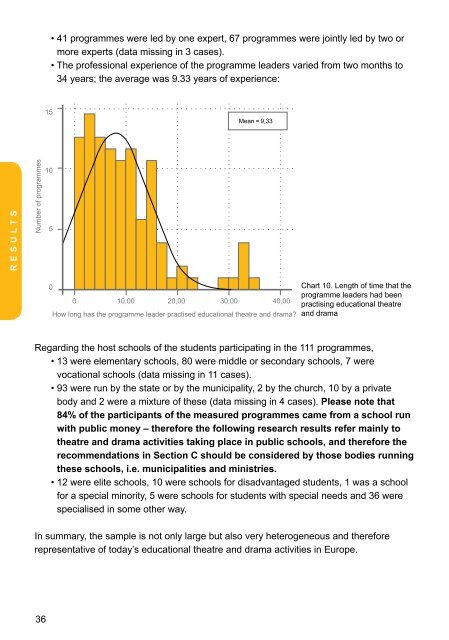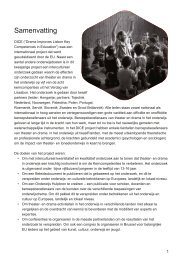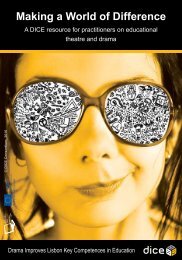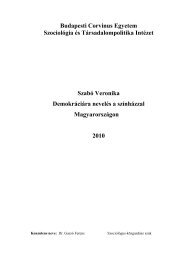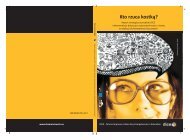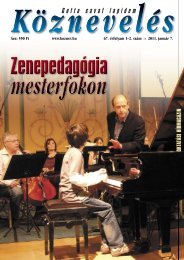Policy Paper - Drama Improves Lisbon Key Competences in Education
Policy Paper - Drama Improves Lisbon Key Competences in Education
Policy Paper - Drama Improves Lisbon Key Competences in Education
Create successful ePaper yourself
Turn your PDF publications into a flip-book with our unique Google optimized e-Paper software.
15<br />
• 41 programmes were led by one expert, 67 programmes were jo<strong>in</strong>tly led by two or<br />
more experts (data miss<strong>in</strong>g <strong>in</strong> 3 cases).<br />
• The professional experience of the programme leaders varied from two months to<br />
34 years; the average was 9.33 years of experience:<br />
Mean = 9,33<br />
B.1. Effect of educational<br />
theatre and drama on<br />
key competence<br />
“Communication<br />
<strong>in</strong> the mother<br />
tongue”<br />
Communication<br />
<strong>in</strong> the mother tongue*<br />
Communication <strong>in</strong> the mother tongue<br />
is the ability to express and <strong>in</strong>terpret thoughts,<br />
feel<strong>in</strong>gs and facts <strong>in</strong> both oral and written form<br />
(listen<strong>in</strong>g, speak<strong>in</strong>g, read<strong>in</strong>g and writ<strong>in</strong>g), and to <strong>in</strong>teract<br />
l<strong>in</strong>guistically <strong>in</strong> an appropriate way <strong>in</strong> the full range of<br />
societal and cultural contexts — education and tra<strong>in</strong><strong>in</strong>g,<br />
work, home and leisure, accord<strong>in</strong>g to their specific needs<br />
and circumstances.<br />
*It is recognised that the mother tongue may not <strong>in</strong> all<br />
cases be an official language of the Member State,<br />
and that ability to communicate <strong>in</strong> an official language<br />
is a pre-condition for ensur<strong>in</strong>g full participation of the<br />
<strong>in</strong>dividual <strong>in</strong> society. Measures to address such cases<br />
are a matter for <strong>in</strong>dividual Member States.<br />
R e s u l t s<br />
Number of programmes<br />
10<br />
5<br />
Analys<strong>in</strong>g the <strong>in</strong>put measurement<br />
data, when those students<br />
who regularly participate <strong>in</strong><br />
educational theatre and drama<br />
activities are compared with those<br />
who do not, significant differences<br />
are found on the follow<strong>in</strong>g scales: 46<br />
Recommendation of the European Parlia ment<br />
and of the Council, of 18 December<br />
2006, on key competences<br />
for lifelong<br />
learn<strong>in</strong>g<br />
R e s u l t s<br />
0<br />
0 10,00 20,00 30,00 40,00<br />
How long has the programme leader practised educational theatre and drama?<br />
Chart 10. Length of time that the<br />
programme leaders had been<br />
practis<strong>in</strong>g educational theatre<br />
and drama<br />
Regard<strong>in</strong>g the host schools of the students participat<strong>in</strong>g <strong>in</strong> the 111 programmes,<br />
• 13 were elementary schools, 80 were middle or secondary schools, 7 were<br />
vocational schools (data miss<strong>in</strong>g <strong>in</strong> 11 cases).<br />
• 93 were run by the state or by the municipality, 2 by the church, 10 by a private<br />
body and 2 were a mixture of these (data miss<strong>in</strong>g <strong>in</strong> 4 cases). Please note that<br />
84% of the participants of the measured programmes came from a school run<br />
with public money – therefore the follow<strong>in</strong>g research results refer ma<strong>in</strong>ly to<br />
theatre and drama activities tak<strong>in</strong>g place <strong>in</strong> public schools, and therefore the<br />
recommendations <strong>in</strong> Section C should be considered by those bodies runn<strong>in</strong>g<br />
these schools, i.e. municipalities and m<strong>in</strong>istries.<br />
• 12 were elite schools, 10 were schools for disadvantaged students, 1 was a school<br />
for a special m<strong>in</strong>ority, 5 were schools for students with special needs and 36 were<br />
specialised <strong>in</strong> some other way.<br />
Scale<br />
Read<strong>in</strong>g and<br />
understand<strong>in</strong>g<br />
(self<br />
assessment)<br />
Confidence <strong>in</strong><br />
communication<br />
(self<br />
assessment)<br />
Humour (selfassessment)<br />
Some typical questions<br />
from the scale<br />
Mean<br />
score of<br />
those who<br />
participate<br />
<strong>in</strong> drama<br />
Mean<br />
score of<br />
those who<br />
do NOT<br />
participate<br />
<strong>in</strong> drama<br />
Difference<br />
Significance<br />
“I easily understand school<br />
textbooks.”<br />
“I like read<strong>in</strong>g.”<br />
“I understand metaphors,<br />
symbols.”<br />
“It is easy for me to read a<br />
newspaper.”<br />
3.8459 3.6352 4.21 % p


